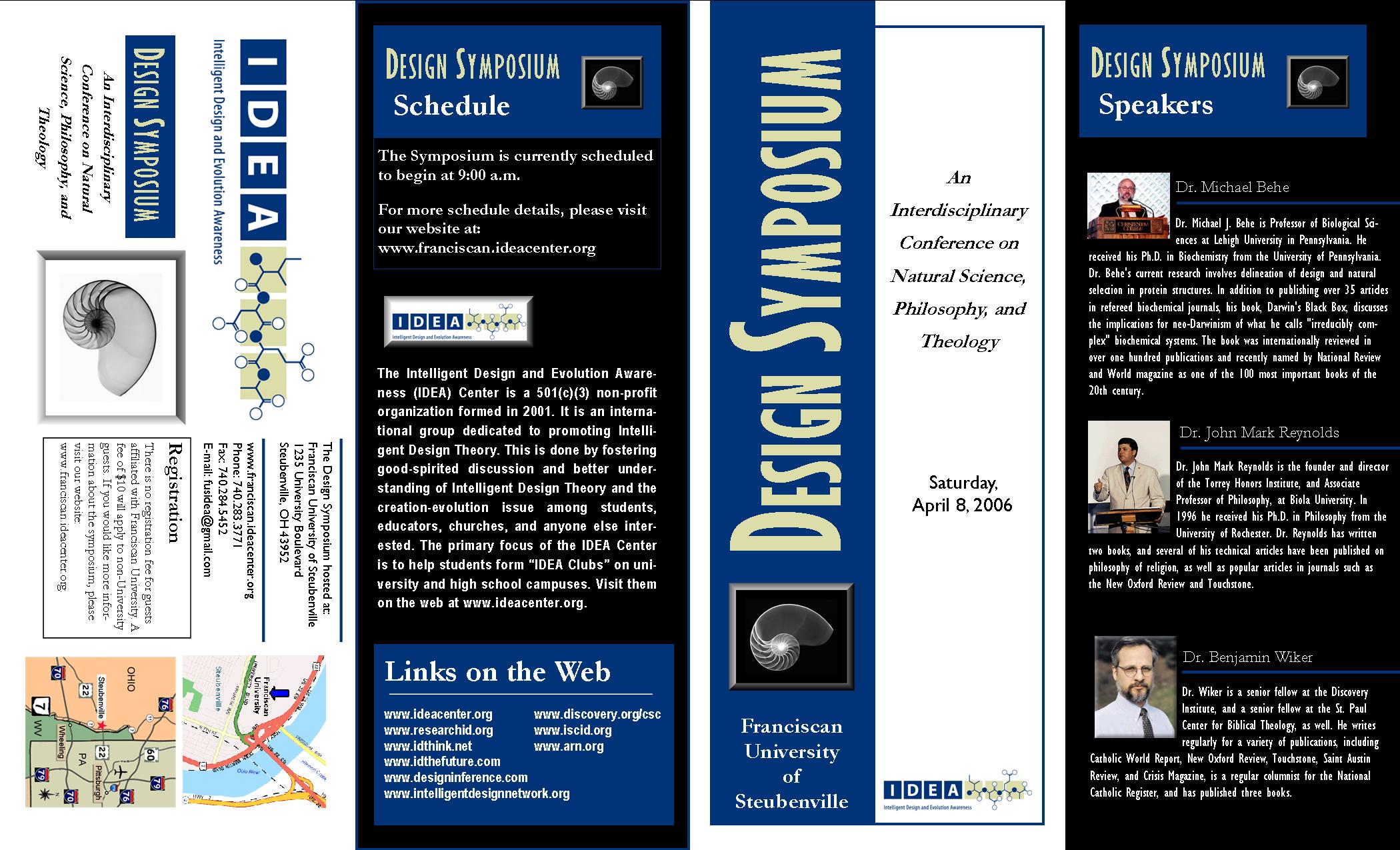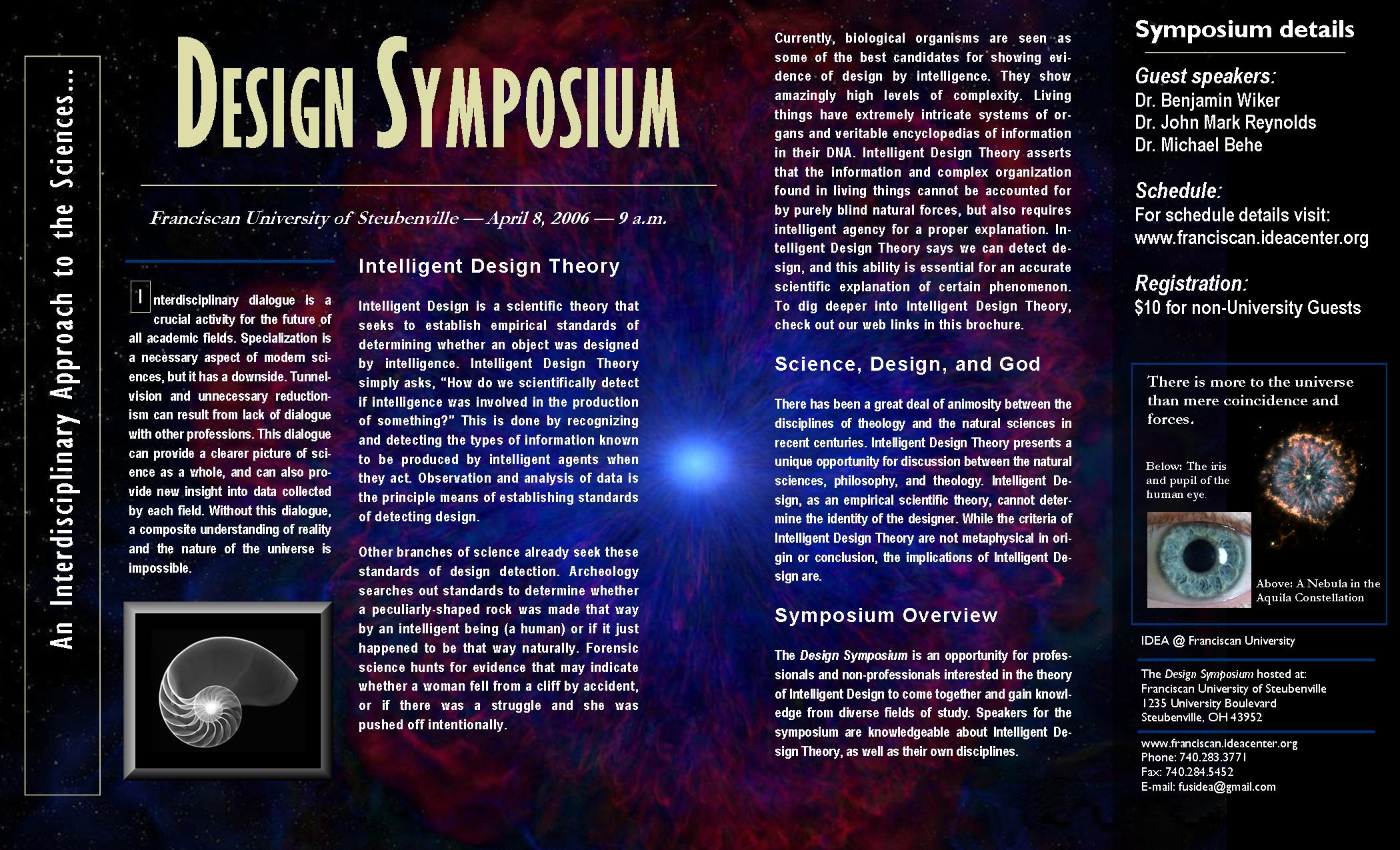
DESIGN SYMPOSIUM
An Interdisciplinary Conference on Natural Science,
Philosophy, and Theology
Franciscan University of Steubenville - Saturday, April 8, 2006 - 9:00 a.m.
[Schedule] - [Registration] - [Brochure] - [Speakers] - [Introduction] - [Contacts] - [IDEA] - [Links]
Schedule
Saturday, April 8, 2006
9:00am
Dr. Benjamin Wiker
10:30am
Workshops
1:00pm
Dr. John Mark Reynolds
3:00pm
Dr. Michael Behe
Registration
There is no registration fee. Donations are welcome.
Speakers
Dr. Michael J. Behe
Dr. Michael J. Behe is Professor of Biological Sciences at Lehigh University in Pennsylvania. He received his Ph.D. in Biochemistry from the University of Pennsylvania. Dr. Behe's current research involves delineation of design and natural selection in protein structures. In addition to publishing over 35 articles in refereed biochemical journals, his book, Darwin's Black Box, discusses the implications for neo-Darwinism of what he calls "irreducibly complex" biochemical systems. The book was internationally reviewed in over one hundred publications and recently named by National Review and World magazine as one of the 100 most important books of the 20th century.
Dr. John Mark Reynolds
Dr. John Mark Reynolds is the founder and director of the Torrey Honors Institute, and Associate Professor of Philosophy, at Biola University. In 1996 he received his Ph.D. in Philosophy from the University of Rochester. Dr. Reynolds has written two books, and several of his technical articles have been published on philosophy of religion, as well as popular articles in journals such as the New Oxford Review and Touchstone.
Dr. Benjamin Wiker
Dr. Benjamin Wiker is a senior fellow at the Discovery Institute, and a senior fellow at the St.. Paul Center for Biblical Theology, as well. He writes regularly for a variety of publications, including Catholic World Report, New Oxford Review, Touchstone, Saint Austin Review, and Crisis Magazine, is a regular columnist for the National Catholic Register, and has published three books.
Symposium introduction
An Interdisciplinary Approach to the Sciences...
Interdisciplinary dialogue is a crucial activity for the future of all academic fields. Specialization is a necessary aspect of modern sciences, but it has a downside. Tunnel-vision and unnecessary reductionism can result from lack of dialogue with other professions. This dialogue can provide a clearer picture of science as a whole, and can also provide new insight into data collected by each field. Without this dialogue, a composite understanding of reality and the nature of the universe is impossible.
Intelligent Design Theory
Intelligent Design is a scientific theory that seeks to establish empirical standards of determining whether an object was designed by intelligence. Intelligent Design Theory simply asks, “How do we scientifically detect if intelligence was involved in the production of something?” This is done by recognizing and detecting the types of information known to be produced by intelligent agents when they act. Observation and analysis of data is the principle means of establishing standards of detecting design.
Other branches of science already seek these standards of design detection. Archeology searches out standards to determine whether a peculiarly-shaped rock was made that way by an intelligent being (a human) or if it just happened to be that way naturally. Forensic science hunts for evidence that may indicate whether a woman fell from a cliff by accident, or if there was a struggle and she was pushed off intentionally.
Currently, biological organisms are seen as some of the best candidates for showing evidence of design by intelligence. They show amazingly high levels of complexity. Living things have extremely intricate systems of organs and veritable encyclopedias of information in their DNA. Intelligent Design Theory asserts that the information and complex organization found in living things cannot be accounted for by purely blind natural forces, but also requires intelligent agency for a proper explanation. Intelligent Design Theory says we can detect design, and this ability is essential for an accurate scientific explanation of certain phenomenon. To dig deeper into Intelligent Design Theory, check out our web links in this brochure.
Science, Design, and God
There has been a great deal of animosity between the disciplines of theology and the natural sciences in recent centuries. Intelligent Design Theory presents a unique opportunity for discussion between the natural sciences, philosophy, and theology. Intelligent Design, as an empirical scientific theory, cannot determine the identity of the designer. While the criteria of Intelligent Design Theory are not metaphysical in origin or conclusion, the implications of Intelligent Design are.
Symposium Overview
The Design Symposium is an opportunity for professionals and non-professionals interested in the theory of Intelligent Design to come together and gain knowledge from diverse fields of study. Speakers for the symposium are knowledgeable about Intelligent Design Theory, as well as their own disciplines.
IDEA
The Intelligent Design and Evolution Awareness (IDEA) Center is a 501(c)(3) non-profit organization formed in 2001. It is an international group dedicated to promoting Intelligent Design Theory. This is done by fostering good-spirited discussion and better understanding of Intelligent Design Theory and the creation-evolution issue among students, educators, churches, and anyone else interested. The primary focus of the IDEA Center is to help students form “IDEA Clubs” on university and high school campuses. Visit them on the web at www.ideacenter.org.
Contacts
- Phone: 740.283.3771
- Fax: 740.284.5452
- E-mail: fusidea@gmail.com
- Franciscan University of Steubenville
1235 University Boulevard
Steubenville, OH 43952
Links
- www.ideacenter.org
- www.researchid.org
- www.discovery.org/csc
- www.iscid.org
- www.idthink.net
- www.arn.org
- www.idthefuture.com
- www.designinference.com
- www.intelligentdesignnetwork.org
Click on an image to view it at full size.


